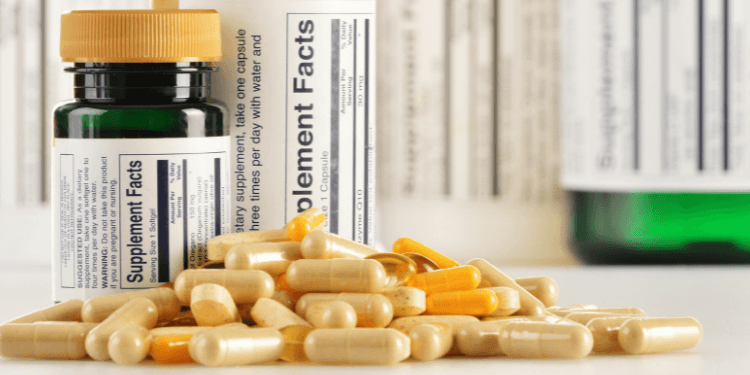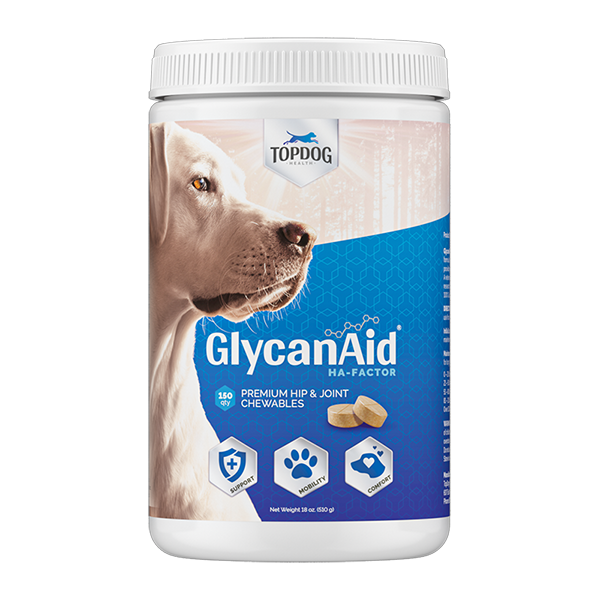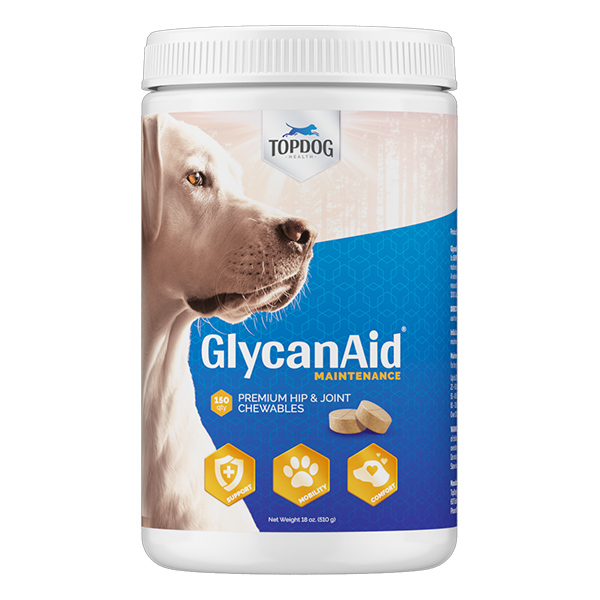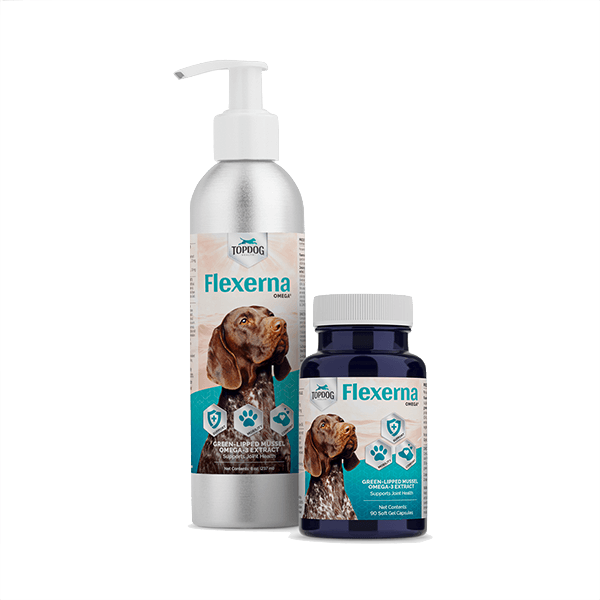Dog joint health can be an overwhelming topic. With all the info out there, it can be hard to know exactly what your dog needs. We’ve narrowed it down to give you the best ingredients, nutrients, and foods to keep your dog’s joints happy and healthy.
As always, we encourage you to talk to your veterinarian before starting your pet on any supplements or medicines.
And remember it’s essential to make sure your dog gets a high-quality joint supplement.
Here are the key ingredients you should look for.
Glucosamine
Glucosamine is an amino sugar that is a building block of the cartilage matrix and stimulates growth of cartilage cells. It has also been known to normalize the synovial fluid which lubricates joints. Glucosamine is naturally produced by your dog’s body, but over time, their natural production becomes inadequate at preventing joint damage and must be supplemented. If you have a dog suffering from arthritis, be sure to help boost their reserve of this crucial nutrient.
Chondroitin
Chondroitin is a cartilage component that promotes water retention (hydration is key for healthy joints) and elasticity needed for mobility. It also inhibits cartilage-destroying enzymes that break down cartilage and joint fluid. Look for Chondropure® which has a low molecular weight molecule for superior uptake.
Methylsulfonylmethane
Methylsulfonylmethane (or MSM) is naturally-occurring, easily-absorbed sulfur that is an essential building block for all cell membranes. In a nutshell, it is a cell rejuvenator, antioxidant, and joint healer. Highly effective at relieving pain and inflammation, it is typically given in pill form but is unfortunately left out of the majority of dog joint supplements. TopDog’s joint supplement GlycanAid contains OptiMSM®, which is the only patented, 99.9% pure, premium distilled MSM on the market and is an easy way to provide your dog with this incredible nutrient.
Cetyl Myristoleate
A relative of the omega-9 fatty acid found in olive oil, cetyl myristoleate is a completely natural long chain esterified fatty acids found in certain animals, such as cows, whales, beavers, and mice – but not dogs (or humans, for that matter). It is a wonderful anti-inflammatory, as well as a pain reliever and immune system modulator. Again, given to dogs in supplement form, it helps to maintain joint mobility and improve range of motion.
Vitamin C (Ascorbic Acid)
Unlike humans, dogs’ bodies are able to create their own vitamin C, but dogs with joint problems need more than what their bodies produce naturally. This antioxidant protects against free radicals that accelerate the aging process and aids in the absorption of the other ingredients. (Look for Easter-C® which is non-acidic and four times stronger than ordinary vitamin C).
Great Salt Lake Salts 
Absorption enhancers make the effects of a nutrient stronger, cancel out the effects of inhibitors, or increase absorption rates and are an important additive to dog supplements. Great Salt Lake Salts are an all-natural, low-sodium full-spectrum, ionic sea-mineral concentrate from Utah’s Great Salt Lake and are important for the effective absorption of vitamins and nutrients.
*Shortcut alert: TopDog’s Joint Supplement GlycanAid contains all of these first 6 ingredients.
Hyaluronic Acid 
Hyaluronic Acid (or HA) is a gel-like substance that is naturally produced by your dog’s body, serving as a shock absorber and helping to lubricate their joint fluid. In older dogs, highly active dogs, or dogs that have suffered an injury, HA can become damaged and lead to joint issues. HA given in supplement form has been shown to be effective in replacing damaged HA in the joints that commonly occur from overuse, age, or trauma.
*TopDog’s advanced joint supplement GlycanAid HA contains the first 6 ingredients, plus hyaluronic acid.
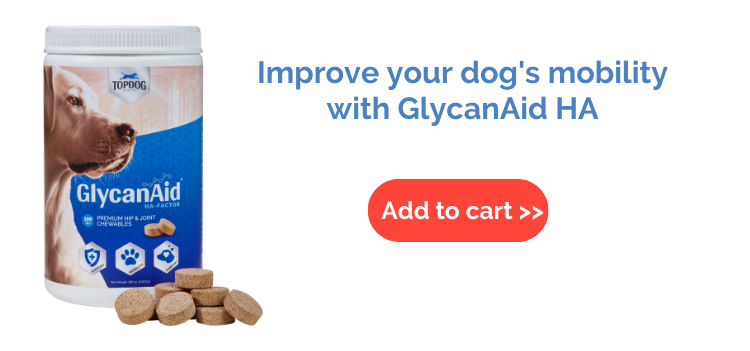
Eicosapentaenoic Acid (EPA) and Docosahexaenoic Acid (DHA) 
These two well-known omega-3 fatty acids reduce inflammation by blocking the enzymes (lipoxygenase and cyclooxygenase) that contribute to it. They work harmoniously together and are found in most omega supplements.
Green Lipped Mussel Extract (Supernol®) 
Unlike fish oils, green-lipped mussel oil contains not only EPA and DHA, but also ETA (eicosatetraenoic acid) – which goes one step further to actually work at the gene level to lower the production of cyclooxygenase (which contributes to pain, fever, and inflammation). This lesser-known fatty acid is the powerhouse ingredient in Flexerna, which makes it more effective at reducing inflammation than your typical omega-3 supplement.
Sodium Hyaluronate 
This is the sodium salt found in hyaluronic acid, the fluid that surrounds your dog’s joints which helps maintain optimal joint health and mobility.
*TopDog’s Omega Supplement Flexerna contains the last 3 ingredients on the list, making it a complete and effective dog omega supplement.
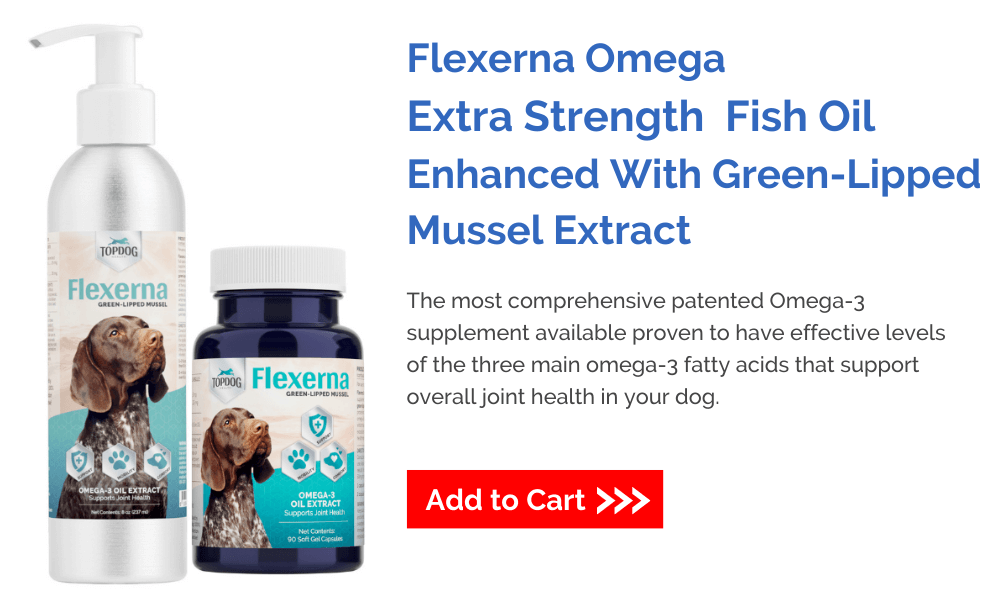
Turmeric 
Turmeric is a spice that’s obtained from the root of the turmeric plant, which is part of the ginger family. In Indian culture, it has been revered for centuries for its medicinal properties, and now we’re seeing the science to back it up. Turmeric contains a compound called curcumin – which is essentially its active ingredient. Curcumin is almost too good to be true. It is an anti-inflammatory, antioxidant, antiviral, antibacterial, anti-fungal, wound healer, and anticancer. This means it is effective not only in fighting inflammation in arthritic dogs to help relieve their pain and slow the progression of the disease, but that it can also help fight diseases like diabetes, cancer, gastrointestinal issues, Alzheimer’s, and more. (Hint: Black pepper is needed for uptake, so be sure your dog’s turmeric supplement also contains black pepper, also called “Bioperine”).
CBD 
While CBD comes from the cannabis plant, it’s not marijuana. In fact, it’s hemp (which means it has no intoxicating effect). It is a cannabinoid that is a natural pain reliever and anti-inflammatory, with no adverse side effects. It helps with pain relief by interacting with cannabinoid receptors in your dog’s endocannabinoid system to modulate things like pain, anxiety, and nausea. Furthermore, numerous studies have shown the effectiveness of CBD in fighting inflammation. By boosting activity in the endocannabinoid system, CBD can help reduce a wide variety of inflammation in organs like the pancreas, lungs, brain, and, most importantly for our arthritic canine companions, the joints. This is not only an added bonus that helps with pain relief (less inflammation = less pain) but is key for slowing the progression of arthritis.
Boswellia 
The resin of the Asian Boswellia tree has been shown to help reduce pain caused by inflammatory diseases such as arthritis by inhibiting the production of a specific type of leukotriene, which modulates the immune response to inflammation. Boswellia also assists in the proper functioning of the immune system cells in the joint, which is necessary for optimal joint health.
Bromelain 
Bromelain is an anti-inflammatory enzyme found in the pineapple plant that digests proteins and promotes plasmin, contributing to healthy tissue in your dog. Its anti-inflammatory properties help manage morning stiffness and joint swelling associated with arthritis. It also has absorption capabilities and a stimulating effect on the development of plasmin, which means that if your dog gets an injury, bromelain will help their tissues heal effectively.
SAM-e 
SAM-e (S-adenosylmethionine) is an amino acid (the building blocks of protein) that is naturally produced in the body. It is an anti-inflammatory that acts as a pain-reliever, may stimulate cartilage growth, and affects neurotransmitters, such as serotonin, which help reduce pain.
ASU 
ASU (avocado/soybean unsaponifiables) has been shown to support joint function and comfort levels by stimulating the production of new cartilage while also decreasing the breakdown of existing cartilage. ASU helps with pain relief by blocking pro-inflammatory chemicals, prevents deterioration of synovial cells, which line joints, and may help regenerate normal connective tissue. Studies have shown that glucosamine/chondroitin sulfate plus ASU works better than glucosamine/chondroitin sulfate alone at inhibiting mediators involved in cartilage breakdown.
Collagen 
Collagen is the connective tissue compound that is responsible for creating bones, muscles, and teeth and for maintaining healthy joints, skin, and tissue cells. Ensuring a proper amount of collagen is present in the body is critical for cartilage production.
Copper 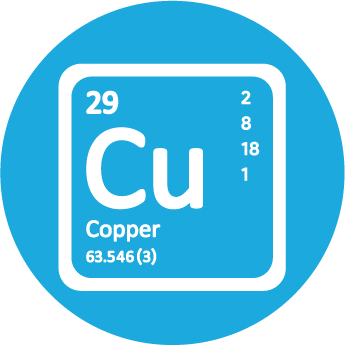
Copper is an essential nutrient needed to manufacture collagen, which is a crucial component of connective tissue. Look for dog foods that contain lentils, garbanzo beans, and/or leafy greens such as spinach and kale, which are all high in copper.
Grape Seed Extract 
Made by drying and pulverizing the bitter-tasting seeds of grapes, grape seed extract (GSE) has a high antioxidant content and can help protect against oxidative stress, tissue damage, and inflammation, and assists in disease prevention. It is also high in flavonoids, and increasing flavonoid consumption is proven to assist in healthy collagen synthesis and bone formation. Animal studies have shown that GSE may suppress bone destruction associated with arthritis and that it significantly reduced pain and joint damage in osteoarthritic mice, improving collagen production and decreasing cartilage loss.
Manganese 
An antioxidant that supports the body’s natural defenses, manganese aids in the production of cartilage and supports normal bone development. In addition, it promotes good muscle and bone health, which is an essential component in maintaining healthy joints.
Vitamin E 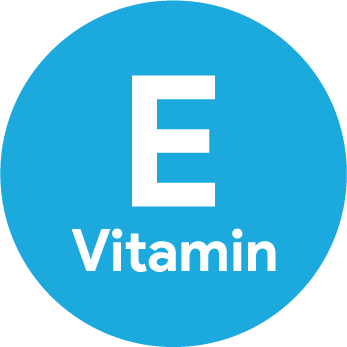
Vitamin E is a powerful antioxidant that provides protection for damaged cells, helping to fight the production of free radicals in the body, which can increase as dogs age. Vitamin E also plays other significant roles in the body, such as forming cell membranes.
Zinc 
Zinc is the second most commonly used mineral in your dog’s body. A powerful antioxidant, it works with over 200 enzymes in the body to aid in proper cell health and metabolism.
CoQ10 
An enzyme naturally found in the body, CoQ10 helps boost energy, fight free radicals, promote a healthy heart, and support metabolic processes. As humans and animals age, CoQ10 naturally diminish, which can contribute to conditions such as heart disease, diabetes, and cancer. A recent study suggests that it may help with arthritis by reducing inflammatory substances and evidence of cell stress based on blood tests.
Cat’s Claw 
Cat’s claw, which is the bark and root of a woody vine that grows in South and Central America, is a powerful anti-inflammatory that promotes healthy joint function and assists with the pain and discomfort associated with arthritis. It inhibits tumor necrosis factor (TNF), an inflammatory messenger that contributes to both acute and chronic inflammation, and may help protect cartilage.
Willow Bark
The bark of the white willow contains salicin, which is a chemical similar to aspirin, as well as powerful anti-inflammatory plant compounds. It is often used as a natural substitute for aspirin in the treatment of musculoskeletal pain and inflammation. Herbalists have successfully used white willow bark for many years to relieve arthritic pain and inflammation in dogs.
Black Cohosh 
A powerful herb that has been used in natural medicine for years, black cohosh – named for its black roots – has the ability to reduce inflammation and swelling in the body. This helps reduce the pain associated with osteoporosis, arthritis, and even neurological conditions.
Creatine Monohydrate 
Creatine Monohydrate is an amino acid derivative that helps the body produce adenosine triphosphate, a compound used for energy by cells. It helps build muscle strength and mass, which is important because, as dogs age, they naturally lose muscle mass, which puts more stress on the joints.
Natural Anti-Inflammatories
Inflammation is the #1 enemy of healthy joints. While anti-inflammatory drugs can have harmful side effects, nature provides a host of safe anti-inflammatories that will help keep chronic inflammation at bay in younger dogs and reduce painful joint swelling in dogs with arthritis. Here are some of our favorites:
Whole Foods
- Fiber-filled veggies: Sweet potato, acorn squash, pumpkin
- Antioxidant-packed fruits: Blueberries, peeled apple, cantaloupe
- Vitamin-rich veggies: Broccoli, cauliflower, zucchini
- Leafy greens: Spinach, kale, collards
- Fatty fish: Salmon, mackerel, tuna, sardines
- Lean protein: Chicken, turkey
Oils
- Omega-3 oils: Fish oil, green-lipped mussel oil
- Coconut oil (mix in with dog’s food or use to sauté dog’s veggies)
- Flaxseed oil (drizzle over dog’s food)
Herbs and Spices
- Fresh ginger root
- Turmeric (fresh root or powdered)
- Cinnamon
- Parsley (bonus = breath freshener!)
Proteins
Equally important to healthy joints is the health of the muscles and soft tissues that support the joints. If a dog starts to slow down from arthritis, the “if you don’t use it, you lose it” principle kicks in, and they start to lose muscle mass, compounding their joint issues.
Proteins are the ticket to keeping your pup’s muscles healthy. They are the main building blocks of the body, used to build and repair muscle and other body tissues. In reality, your dog does not need protein but rather the building blocks that makeup protein, which are called amino acids. The levels of amino acids vary in each protein source, and each protein varies in its ability to be broken down into amino acids.
What this means is that you want to choose quality protein sources that are high in both bioavailability and digestibility. These include:
- Egg
- Fish
- Beef
- Chicken
- Lamb
- Rice
When picking your pup’s food, ensure one of these quality protein sources is listed in the first few ingredients. And of course, whole foods should always be a focus.
Water
Water deserves a category all its own. Providing your dog with a steady supply of cool freshwater is one of the easiest (not to mention cheapest) things you can do to promote healthy joints. Proper hydration is key for keeping joints adequately lubricated, allowing them to move and flex as needed. Dehydration can lead to stiff tendons and ligaments, which can cause heightened pain in arthritic dogs and increase the risk of injury.
“People Foods”
Yes, people foods are good for your dog’s joints! Don’t be afraid to add the following foods to your pup’s meal rotation for a healthy kick.
Pumpkin
Pumpkin is a great source of vitamin A and fiber and is easily digestible – making it a top choice for dogs with sensitive stomachs. Give them canned or fresh, cooked pumpkin with no added sugars and spices.
Cranberries
These little red berries pack a healthy dose of antioxidants, minerals, and vitamins. Plus, if your pup has problems with urinary tract infections or bladder stones, cranberries may help by lowering the pH of their urine. Feed them lightly cooked fresh or frozen cranberries. Canned cranberries (whole or jellied) are typically higher in calories, so don’t overdo it.
Green Beans
Before you throw all your green beans into a casserole, toss a few raw ones to your pup. Green beans are very high in fiber but low in calories, meaning they’ll fill your dog up without packing on the pounds.
Sweet Potatoes
These root veggies are high in fiber, low in fat, and packed with vitamins and antioxidants. Steam or bake them without seasoning to lock in their nutritional value (as opposed to roasting) for a sweet treat your dog will love.
Sliced Apples
If you’re slicing apples for a pie, place a few in your dog’s bowl to give them a boost of phytonutrients, vitamin A, and vitamin C. Don’t worry about peeling the apples first, but be sure to remove the seeds as they naturally contain cyanide.
Celery
Try cutting some celery into bite-size chunks for a crunchy treat your dog will love. Celery is low in calories, making it a great weight-loss treat, and is an excellent source of fiber, folate, potassium, and vitamins A, C, and K.
Brussels Sprouts
Even if you can’t get your kids to eat their Brussels sprouts, there’s a good chance your dog will love them. Feed them raw, steamed, or baked for a boost of vitamins K and G, folate, fiber, and potassium.
Honey
If you’re adding honey to your tea in the morning, go ahead and drizzle a little over your dog’s breakfast as well. Honey is a nutritional powerhouse for your pooch, loaded with vitamins, calcium, potassium, magnesium, and antioxidants.
Carrots
Baby carrots straight out of the bag make a great low-calorie treat, especially for overweight dogs. Carrots are high in fiber and vitamin A, and your pup will love their crunchy texture. As an added bonus, chewing raw carrots also acts as a natural teeth cleaner, helping to remove plaque and debris.


